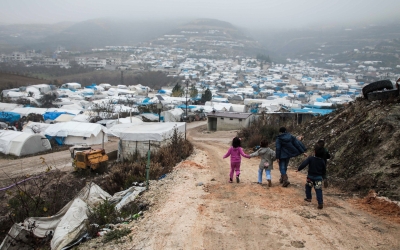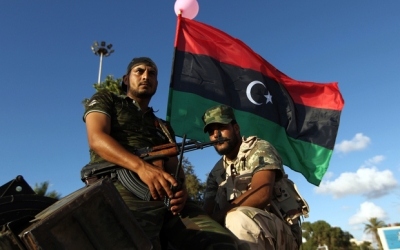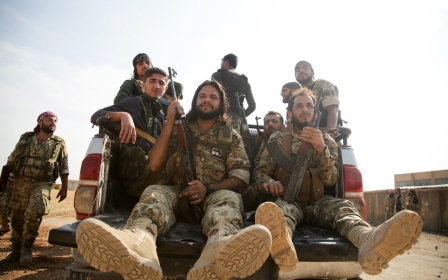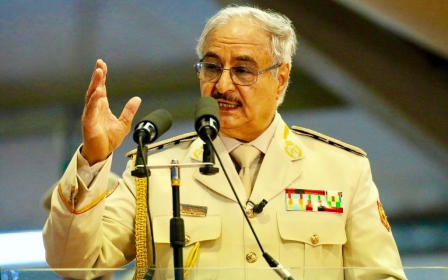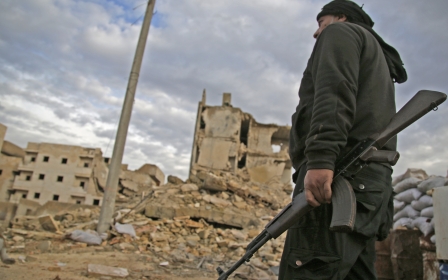Turkey's parliament approves troop deployment to Libya
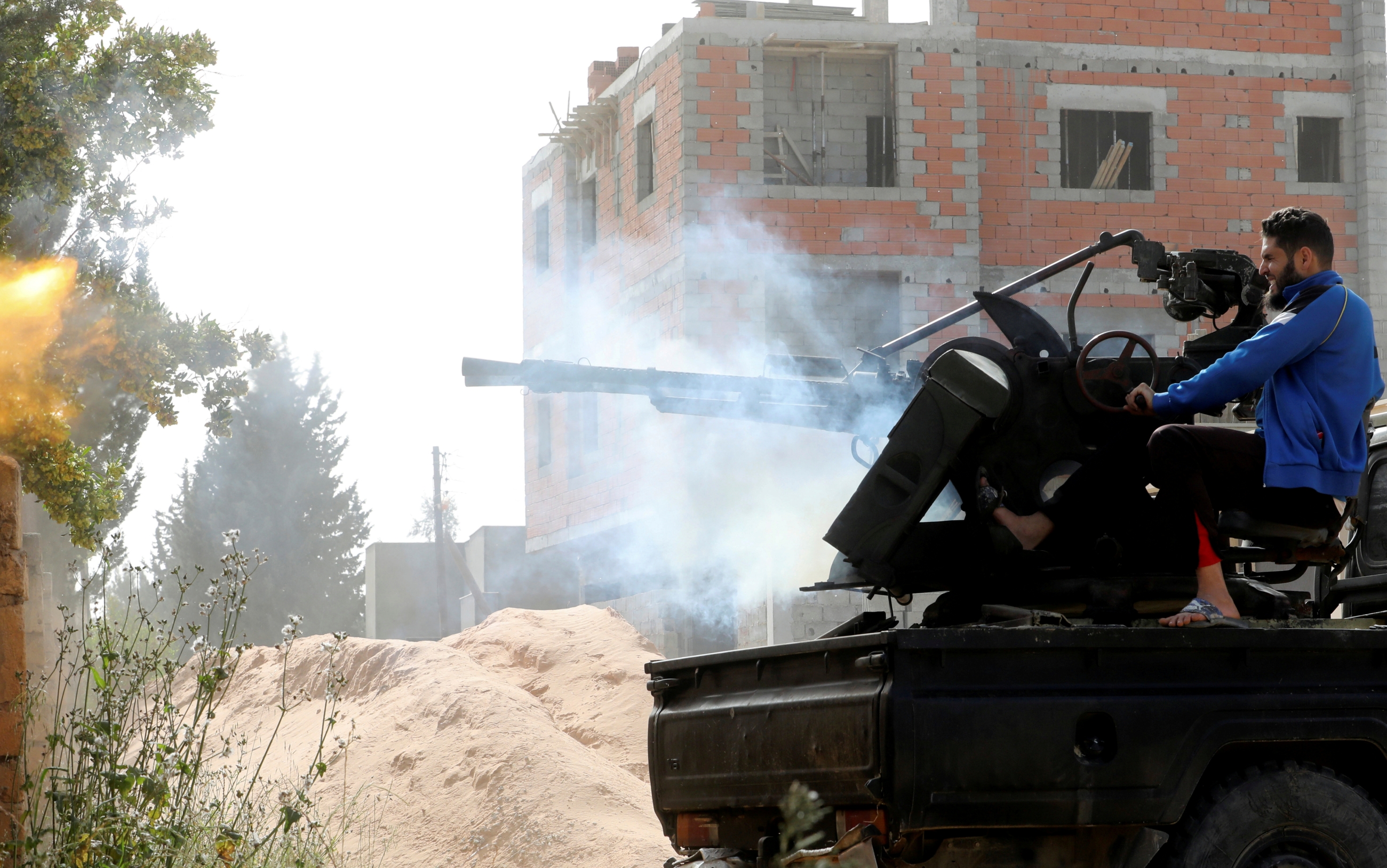
Turkey's parliament has adopted a motion - with 325 votes in favour and 184 against - authorising President Recep Tayyip Erdogan to deploy military forces to Libya, where the UN-recognised government has been struggling to stop an advance by forces led by Khalifa Haftar.
The Tripoli-based Government of National Accord (GNA) has been fending off a months-long offensive by Haftar's forces, who are backed by the United Arab Emirates (UAE) and Egypt, and are also supported by fighters and mercenaries from Sudan and Russia.
Clashes in and around the Libyan capital have killed more than 1,000 people and wounded another 6,000. According to UN agencies, more than 120,000 people have been displaced.
'The LNA [Haftar's forces] has issued threats against Turkish interests that include Turkish citizens, Turkish companies and ships that sail under the colours of the Turkish flag,'
- President Recep Tayyip Erdogan
Opposition parties in Turkey's parliament, which is dominated by the ruling AKP, strongly opposed Thursday's motion, saying that Ankara had nothing to do with the four-year-long civil war in the oil-rich country.
Retired Ambassador Unal Cevikoz, a deputy from the main opposition CHP, accused the government of dragging Turkish troops into a disastrous adventure in the North African desert.
New MEE newsletter: Jerusalem Dispatch
Sign up to get the latest insights and analysis on Israel-Palestine, alongside Turkey Unpacked and other MEE newsletters
"The motion limits the Turkish Parliament's authority by transferring it to the president for an unknown mission," he said.
"Not only is it against the Turkish constitution, but it also violates the UN arms embargo on Libya."
The UN imposed an arms embargo on Libya in 2011, however, Ankara claims that the Government of National Accord’s (GNA) official invitation for military deployment is permitted under international law.
Opposition MPs, chiefly pro-Kurdish HDP members, have accused the Turkish government of hastening aide due to the GNA’s alleged connection to the Muslim Brotherhood.
"After Syria, you are embarking on another ideological adventure due to the Brotherhood's ties to [the Libyan government]," Tulay Hatimogullari, a deputy from the HDP, said during the parliamentary debate on the motion.
CHP chairman Kemal Kilicdaroglu said in a statement released on Twitter that instead of sending Turkish soldiers, Ankara should try to get a United Nations peacekeeping mission in Libya to stop the bloodshed.
Technical support and military training
The deployment of Turkish forces to Tripoli would mark a new phase in the war where Turkey has thrown its support behind the UN-backed Government of National Accord (GNA).
Earlier this year, Erdogan said that Ankara has sold arms and ammunition to the Libyan government, possibly including armed drones and armoured vehicles, to embolden the GNA’s defences against commander Khalifa Haftar’s self-styled Libyan National Army (LNA).
With parliament’s authorisation, Erdogan is now able to send military units that could include combatant and non-combatant forces, instructors, technical staff, as well as donate weapons and ammunition to the Tripoli government for a year.
Last week, the GNA officially requested military support from Ankara.
However, Turkish Defence Minister Hulusi Akar said on Tuesday that the military wasn't planning to deploy combatant forces.
"We will only send troops that could provide technical support and military training as well as needed air defence systems and weapons," he said in televised remarks.
Turkish Vice President Fuat Oktay, on the other hand, said on Wednesday that Turkey wouldn’t need to deploy forces at all if Haftar stops his offensive against Tripoli.
Ankara also plans to send Syrian rebel units, chiefly from Sultan Murad Brigade, among other groups, to Libya to help the GNA better defend itself.
Ankara’s involvement in Libya has increased since it signed two memorandum of agreements with Tripoli in November.
'LNA has issued threats against Turkish interests'
Erdogan, in a letter to Parliament earlier this week, cited these agreements among the chief reasons that led to the government decision to send forces to Libya.
The letter mentioned the maritime delimitation deal signed with Tripoli as something "highly important". The deal has agitated Greece and Cyprus for disputing their own claims on territorial waters in the Eastern Mediterranean.
"The Libya National Army is also targeting civilians and civilian infrastructure, which is worsening the humanitarian situation in the country," Erdogan said.
"The LNA has issued threats against Turkish interests that include Turkish citizens, Turkish companies and ships that sail under the colours of the Turkish flag."
In his speeches last month, Erdogan mentioned the presence of the Russian private security company, Wagner Group, supporting Haftar in Libya as something legitimising Ankara's move.
Akar said that Turkey was not planning to clash with Russia in Libya.
"We are looking for ways to cooperate with Moscow," the defence minister said. Several reports indicate that Egypt and the United Arab Emirates have provided sophisticated weapons, such as armed drones and air defence systems, to the LNA.
Turkey's ties to Libya go back to the late Ottoman Empire. Mustafa Kemal Ataturk, the founder of modern Turkey, as well as many prominent Turkish politicians, fought against the Italian invasion in Libya in 1911.
In 2011, Erdogan, then-prime minister, initially opposed Nato's military intervention against Muammar Gaddafi's government, with whom Ankara had several construction deals.
Middle East Eye delivers independent and unrivalled coverage and analysis of the Middle East, North Africa and beyond. To learn more about republishing this content and the associated fees, please fill out this form. More about MEE can be found here.


